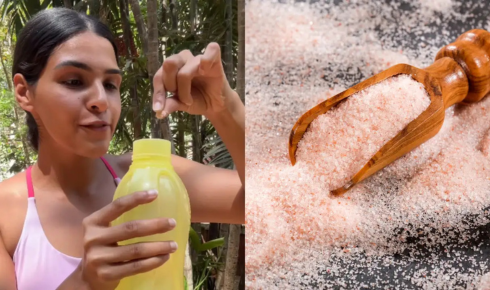There’s something funny about hydration advice these days. Everyone’s either telling you to drink more water or buying some high-tech bottle that tracks every sip. But somehow, even after downing all that water, a lot of us still feel dry — lips cracked, energy low, brain foggy. You start wondering if you’re doing something wrong. Spoiler: it’s not about how much water you drink, but how well your body actually absorbs it.
That’s where a surprising hero enters the story — salt.
The Science of Staying Truly Hydrated
Your body doesn’t just need water. It needs electrolytes — minerals like sodium, potassium, and magnesium — to hold onto that water and use it effectively. Without them, hydration becomes like pouring water into a leaky bucket. You drink, you pee, and you’re still thirsty.
That’s why learning how to hydrate with salt has become such an interesting topic among wellness circles and athletes alike. It’s not about drinking salty water like you just swallowed ocean waves — it’s about balance. A tiny pinch of high-quality salt helps your body retain fluids and restore electrolytes that plain water flushes out too quickly.
This simple adjustment can make a world of difference, especially if you sweat a lot, drink caffeine regularly, or live somewhere hot and humid.
Why We Lost Touch With Real Hydration
Our ancestors drank from mineral-rich springs and rivers — water that naturally contained electrolytes. These minerals helped keep their bodies balanced without fancy sports drinks or supplements. Today, though, our water is filtered, treated, and often stripped of those same minerals. It’s cleaner, yes, but sometimes too clean for optimal hydration.
We’ve basically removed the very thing that helped our bodies hold onto moisture in the first place. It’s no wonder so many people experience chronic dehydration despite guzzling liters of water.
A small pinch of unrefined salt, like sea salt or Himalayan pink salt, can restore some of what modern life has taken away.
The “Salt and Water” Combo: A Misunderstood Duo
When you first hear the idea of mixing salt into your drinking water, it might sound odd — or even unhealthy. After all, we’ve been warned for years about excess sodium and its connection to high blood pressure. But it’s not that simple.
The truth is, not all salt is created equal. Processed table salt — the kind you find in most restaurant shakers — is heavily refined and often stripped of trace minerals. On the other hand, natural salts like sea salt contain dozens of minerals in trace amounts that your body actually needs.
So if you’ve ever wondered, does sea salt help with hydration, the short answer is yes — when used in moderation. Sea salt contains not just sodium but also magnesium, calcium, and potassium, which together support the balance of fluids in your body.
It’s not about drinking salty water every day. It’s about adding just enough to enhance absorption and help your cells do their job.
How to Do It Without Overdoing It
Let’s be clear: we’re not talking about turning your water bottle into a mini ocean. A good starting point is about 1/8 teaspoon of unrefined salt per liter of water. That’s roughly a pinch between your fingers — enough to make a difference but not enough to taste briny.
If you’re working out, spending time in the sun, or recovering from a hangover, a little more might help replenish what you’ve lost through sweat. Some people also like to add lemon juice or a drizzle of honey to balance the taste and add natural electrolytes.
You can think of it as a homemade hydration booster — a natural alternative to store-bought electrolyte mixes that often come packed with sugar and additives.
The Subtle Changes You’ll Notice
After a few days of drinking mineral-enriched water, people often report feeling more energetic, more focused, and less fatigued. Headaches that once appeared mid-day might fade away. Your skin may even start looking a bit healthier — more plump, less tired.
It’s the kind of change that sneaks up on you. You don’t feel an immediate “wow,” but rather a gradual steadiness that becomes hard to ignore.
It’s especially noticeable in hot weather or during intense workouts when hydration truly matters. Your body seems to recover faster, and that constant dry-mouth feeling just disappears.
But Is It Safe?
Naturally, the next question most people ask is: can I drink water with salt every day without harming myself? The answer depends on how much salt you use and what your health conditions are.
For healthy individuals, small amounts of mineral salt are perfectly safe and even beneficial. The problem only arises when you consume large amounts of refined sodium — typically from processed foods, not water.
If you have hypertension, kidney issues, or are on a sodium-restricted diet, it’s best to consult your doctor before experimenting. But for the average person, a pinch of natural salt in a glass or two of water per day is gentle and effective.
Common Mistakes People Make
One of the biggest mistakes people make is using too much salt or the wrong kind. Regular iodized table salt doesn’t offer the same benefits and can make the water taste harsh. Go for unprocessed sea salt, Celtic salt, or Himalayan pink salt instead.
Another mistake? Thinking this replaces a balanced diet. It doesn’t. Salt-water hydration complements healthy eating, it doesn’t replace it. You still need potassium-rich foods like bananas and leafy greens, plus magnesium sources like nuts and seeds.
And, of course, don’t forget to listen to your body. If your water starts tasting too salty or you feel bloated, pull back. Hydration is about balance, not extremes.
The Bigger Picture of Wellness
It’s kind of poetic how something as simple as water and salt — two of nature’s oldest elements — are making a comeback in modern wellness. It’s not a gimmick, not a quick fix, but a return to balance.
When you think about it, our bodies are like tiny oceans — filled with electrolytes and fluid that keep everything moving. Maybe it’s no surprise that a little salt helps us stay in sync with that natural rhythm.
Wrapping It Up: The Pinch That Makes a Difference
Good hydration isn’t just about drinking more water; it’s about drinking smarter. Adding a pinch of natural salt helps your body use water the way it’s supposed to — efficiently, effectively, and sustainably.
So, the next time you fill your bottle, consider giving it a small mineral upgrade. No fancy supplements, no overpriced drinks, just a little knowledge and a grain (or two) of salt.
It’s the simplest health habit you’ll ever try — and maybe the one that finally makes you feel truly hydrated.

